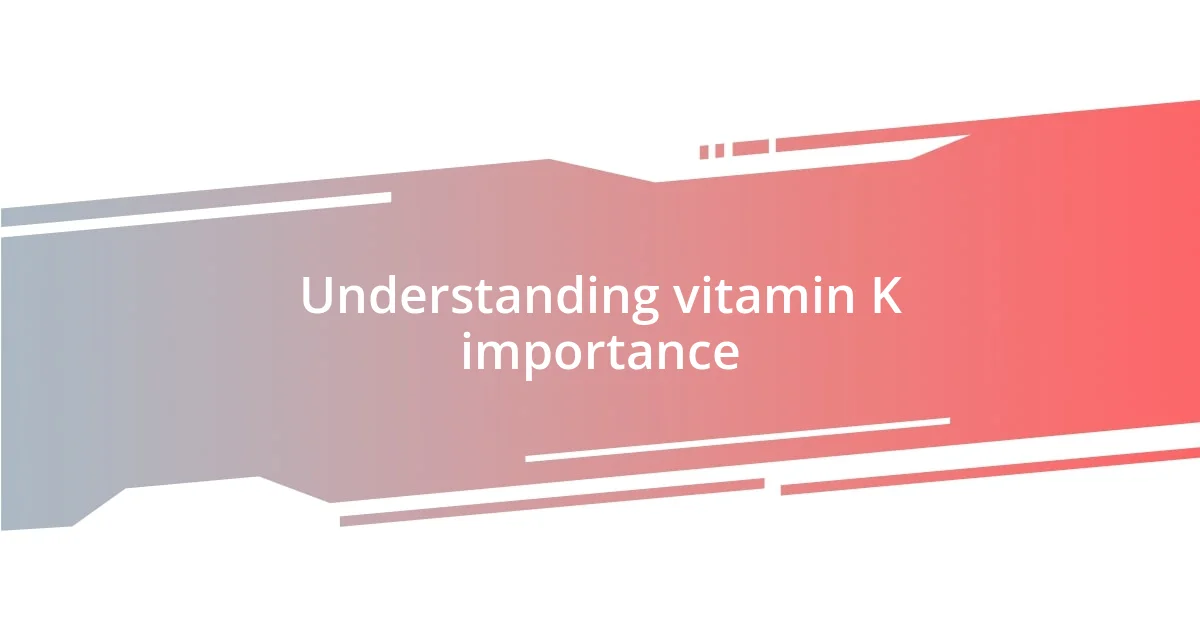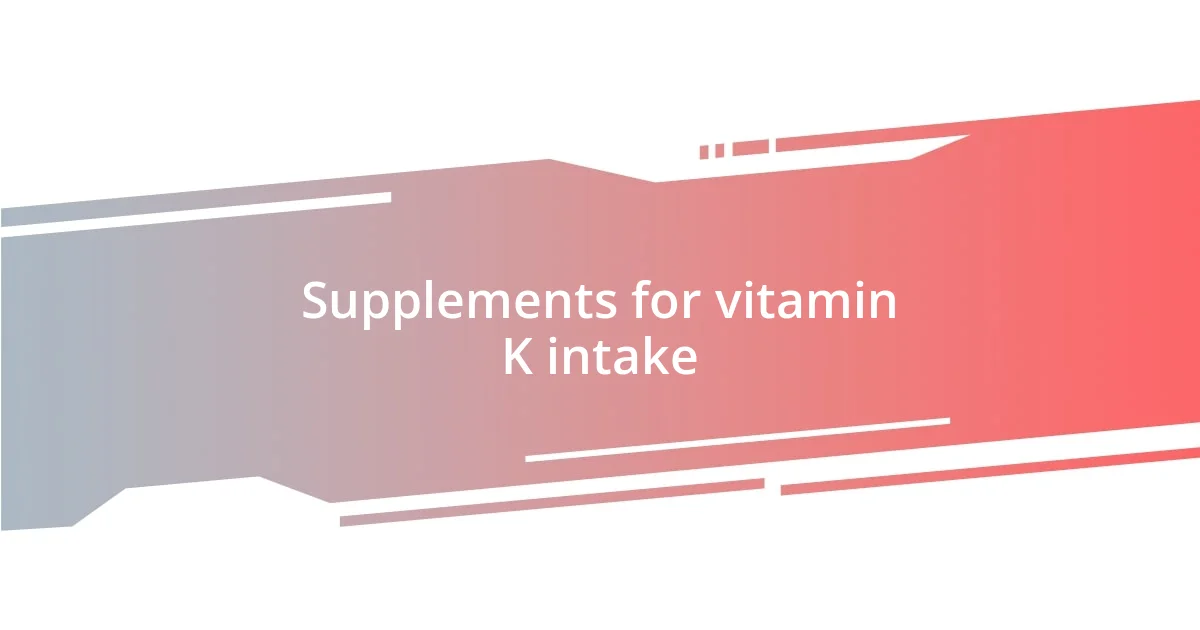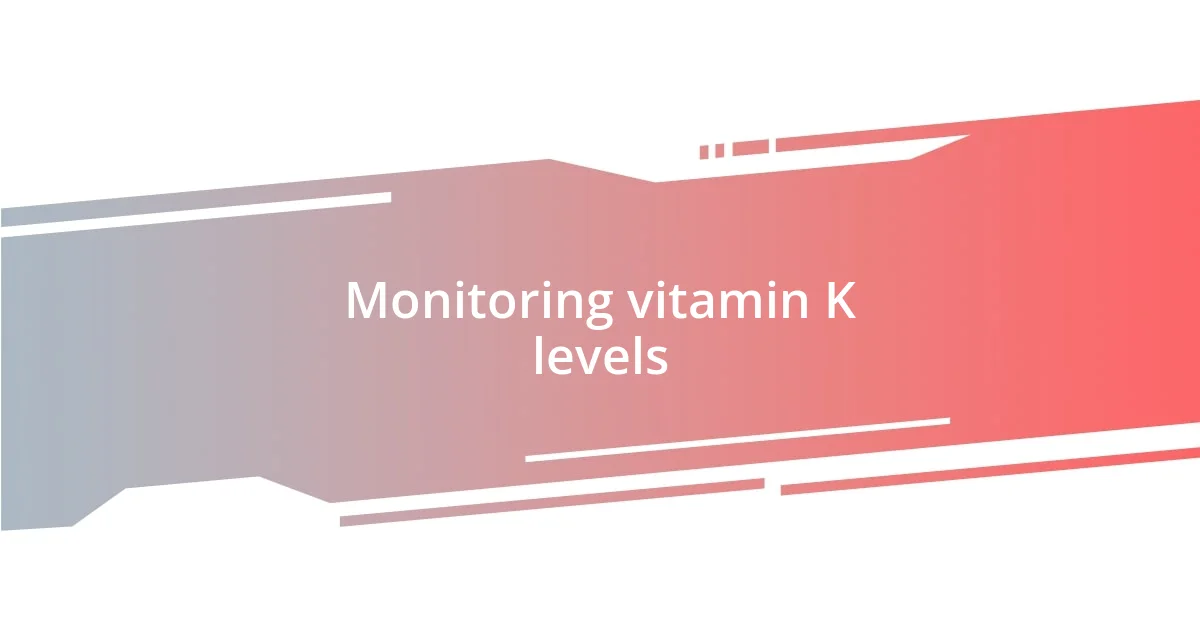Key takeaways:
- Vitamin K is essential for blood clotting and bone health, highlighting the importance of nutrient-rich foods like greens and fermented items in our diets.
- Supplements can effectively help meet vitamin K intake needs, with options like K1 capsules, K2 sources, multivitamins, and liquid forms available for convenience.
- Monitoring vitamin K levels through diet tracking and blood tests is crucial for overall health, particularly for those with clotting issues or on certain medications.

Understanding vitamin K importance
Vitamin K plays a crucial role in blood clotting, something I didn’t fully appreciate until I cut my finger while cooking. It’s fascinating how our bodies rely on this vitamin to prevent excessive bleeding, which reminds me of how small issues can have significant consequences. Have you ever considered what would happen if we didn’t have this essential nutrient?
Beyond clotting, I learned that vitamin K contributes to bone health. I remember a friend of mine who was struggling with osteoporosis – it’s alarming how lack of essential nutrients can affect our lives. Incorporating greens like kale and spinach into our diets can make a real difference. Have you ever thought about how your meals support or hinder your health?
Now, I find it intriguing that there are two main types of vitamin K: K1 and K2. While K1 is mainly found in plant foods, K2 comes from fermented sources, like natto. When I first tried natto, I was hesitant due to its texture, but learning about its benefits made me more open. How about you? What foods have you embraced, realizing their importance for your health?

Supplements for vitamin K intake
When it comes to ensuring adequate vitamin K intake, supplements can be a viable option, particularly for those who might struggle to get enough through diet alone. I remember when I first realized that my greens weren’t making it to my plate regularly. It was eye-opening to discover how easy it could be to fill this gap with vitamin K supplements. They come in various forms, including capsules and liquid drops, making them convenient to add to my daily routine.
Here are some popular options for vitamin K supplements:
- Vitamin K1 capsules: Often derived from alfalfa or other green plants.
- Vitamin K2 supplements: Typically sourced from fermented foods; I found menaquinone (MK-7) particularly effective.
- Multivitamins: Some contain vitamin K, which can be an easy way to maintain overall nutrient levels.
- Liquid vitamin K: This form can be especially helpful for those who have difficulty swallowing pills.
Starting with supplements can feel daunting, but I discovered they complement a well-rounded diet beautifully, especially on busy days when cooking isn’t an option.

Monitoring vitamin K levels
Monitoring vitamin K levels is something I’ve started taking seriously, especially after experiencing some unexpected bruising. Initially, I brushed it off as just part of getting older, but then I began to wonder: could my vitamin K levels be out of whack? It turns out that routine blood tests can provide insights into our clotting abilities, which means monitoring this vitamin is more crucial than I previously thought.
I learned that vitamin K isn’t commonly tested unless there’s a specific reason, like ongoing issues with blood clotting or if you’re on anticoagulant medications. In conversations with my doctor, it became clear just how interconnected our diets and health are. Have you ever reflected on how a simple vitamin could affect your everyday well-being? For me, it was a wake-up call to keep a closer eye on what I was eating and how it could impact my body at a deeper level.
To track my vitamin K intake better, I started keeping a food diary, noting the greens and fermented foods I consumed. I noticed a direct connection between what I ate and my energy levels. It felt empowering to see how such a small adjustment could lead to big changes. Have you ever tried journaling your meals? It can truly open your eyes to your dietary habits and their impact on your health, especially regarding essential nutrients like vitamin K.















